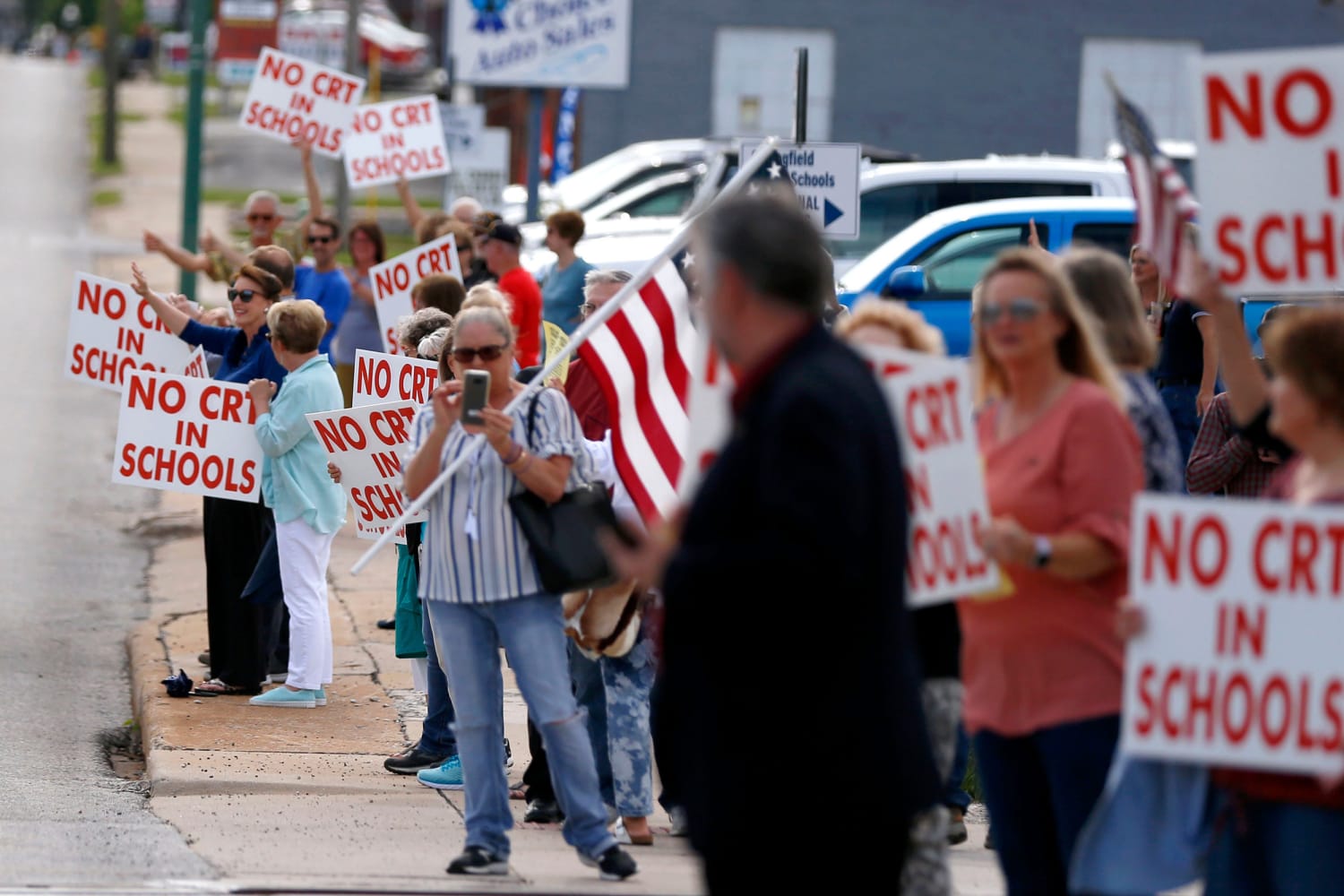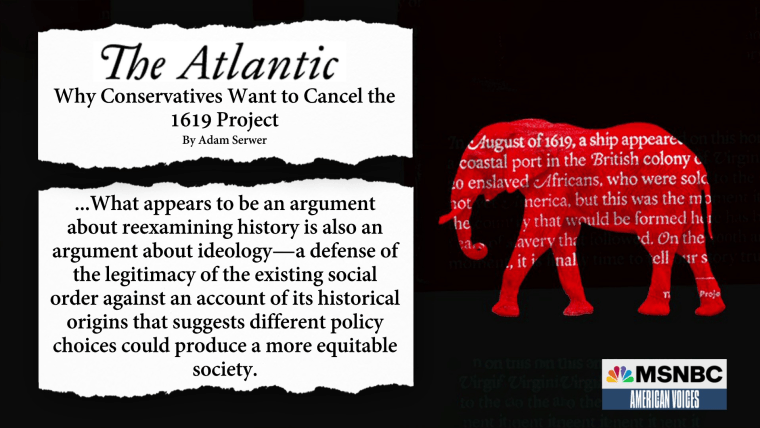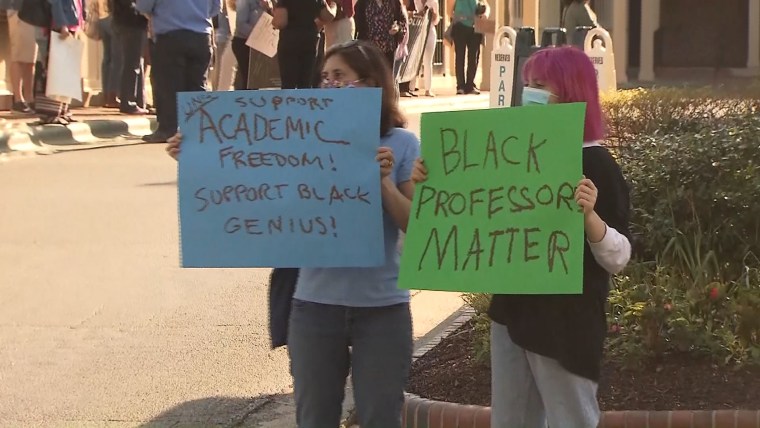This story about social studies was produced by The Hechinger Report, a nonprofit, independent news organization focused on inequality and innovation in education.
As Chris Tims, a high school teacher in Waterloo, Iowa, sees it, history education is about teaching students to synthesize diverse perspectives on the nation’s complicated past.
It’s why Tims includes articles from “The 1619 Project” — a New York Times look at the consequences of slavery and the contributions of Black Americans — in the curricula for his classes.
“You can’t tell the whole story of the United States without telling the story of slavery or discussing the Black experience,” said Tims, who teaches courses on U.S. and African American history.
But Iowa state Rep. Skyler Wheeler, a conservative, has a different view on the Pulitzer Prize-winning project, which has been expanded to include reading guides and lesson plans. To Wheeler, one of several state lawmakers around the country trying to ban “The 1619 Project,” the resources are dangerous and divisive — “leftist political propaganda masquerading as history,” as he put it at a recent hearing.
“’The 1619 Project’ seeks to tear down America, not lift her up,” he said.
Such disagreements are hardly new. Americans have been arguing over what to teach children about U.S. history and civics since at least Reconstruction, the turbulent period that followed the Civil War. Some call this teaching conflict — now more than a century old — the “social studies wars.”
But as the nation has splintered along political and geographic lines, the fights have intensified, compounding the challenges facing social studies, a set of subjects including civics, history and political science that has long been starved for classroom time and resources.
Now, a group of prominent academics and educators is pitching what they hope will be a way forward for the field. Their “Roadmap to Educating for American Democracy,” which calls for a massive federal investment in history and civics, is an attempt to reach a consensus on the key questions teachers should tackle. Instead of standards and curricula, it offers seven themes, six “core pedagogical principles,” and five design challenges, all aimed at helping educators develop customized curricula and lesson plans.
Already, though, the roadmap is proving to be a political Rorschach test, with liberals and conservatives seeing opposite threats in its contours. To conservatives, the framework is a “Trojan horse” for a “woke” federal curriculum; to liberals, it’s a license to schools to teach any version of history they like.
Yet there are also signs that Americans are growing weary of partisan bickering and see social studies as a way to unite the nation. When surveyed about seven potential reforms to strengthen American identity, more than half of Democrats and Republicans alike said civic education for all students in kindergarten through 12th grade would have the biggest impact.
If the roadmap’s backers hope to revitalize the discipline, they’ll need to seize on this sentiment while convincing skeptics on both sides of the political spectrum to give their plan a chance.
It won’t be easy.
A second-tier subject
The latest skirmishes in the social studies wars started with former President Donald Trump, who barred federal agencies from conducting racial sensitivity training and threatened to withhold federal funding from schools that taught “The 1619 Project.” The day before the 2020 election, he created a commission that produced “The 1776 Report,” a counterpoint to “The 1619 Project.”
When Trump left office in January, the battle shifted to the states. So far this year, Republicans in at least five states have introduced bills to ban the teaching of “The 1619 Project.” Lawmakers in at least a dozen states, including Iowa, have sponsored bills modeled after Trump’s ban on racial bias training that would block schools and colleges from discussing “divisive concepts,” including the idea that the United States or specific states are fundamentally racist. So far, four states have passed them.
State legislators aren’t the only ones seeking to stop schools from teaching certain subjects and ideas. The governors of Mississippi and South Dakota have requested legislative funding for courses and curricula that promote patriotism, while lieutenant governors in North Carolina and Idaho have formed task forces dedicated to uncovering “indoctrination” by schools.
The Biden administration entered the fray in April, citing the “landmark ‘1619 Project’” and the work of anti-racist scholar Ibram X. Kendi in a notice proposing that the chief federal grant program for history and civics education give priority to projects that incorporate diverse perspectives into teaching. The president’s apparent endorsement of the Times’ project and critical race theory, an academic framework that maintains that racism is embedded in American institutions, elicited a swift rebuke from Senate Minority Leader Mitch McConnell, R-Ky., who warned the move would politicize a historically bipartisan grant program.
Meanwhile, conservative groups like Turning Point USA, a student organization created by conservative activist Charlie Kirk and funded by right-wing megadonors, and Prager University, a nonprofit media company co-founded by a talk show host, are crafting their own curricula, offering them as antidotes to leftist teaching.
Amid all this conflict, the one thing nearly everyone agrees on is that social studies has been given short shrift in American schooling. The typical third grader today spends roughly 10 hours a week on English and six hours on math, but less than three hours on social studies, according to the most recent data from the U.S. Education Department.
There’s also a general consensus that the neglect of social studies is both a cause and a result of the country’s current civic dysfunction.
“Political polarization has damaged the standing of civics and history,” said Paul Carrese, a conservative professor of civic thought and leadership at Arizona State University and a key contributor to the roadmap.
“School boards don’t want to deal with it, principals don’t want to deal with it,” he said, so it becomes a “second-tier subject.”
As the field has become more politicized, schools have scaled back the time they spend on social studies, leaving their graduates unprepared to navigate political differences. And the cycle repeats itself.
The marginalization of social studies is also due to its exclusion from state standardized tests, scholars on both sides agree. As the old adage goes, “What gets tested, gets taught.”
The substance of social studies
While most states use the Common Core standards for math and English, there are no national social studies standards detailing which facts and historical figures students should study, and state standards vary widely.
The differences among states, and even districts, reflect deep philosophical disagreements over which facts are essential, what a “patriotic” education looks like and whose stories should be told.
Conservatives tend to believe there are core dates and documents that students must be acquainted with to participate fully in American democracy. Liberals value civic knowledge, too, but tend to spend more time connecting history to current events.
Conservatives argue social studies should foster respect for the nation’s founding principles and a belief in a common American identity. Liberals say it should grapple with the racism at the root of the country and tell its history from a diversity of perspectives.
The roadmap, which was financed by the National Endowment for the Humanities and the U.S. Department of Education, steers clear of the content controversies, offering not a list of historical touchpoints but seven themes, each accompanied by a series of questions organized by grades. A report that accompanies the roadmap calls for cultivating in students a “reflective patriotism” that balances “appreciation of the ideals of our political order” with a “candid reckoning with the country’s failure to live up to those ideals.”
The project, which took 16 months and involved more than 300 academics and educators from a variety of ideological perspectives, isn’t the first federally funded attempt to forge an agreement on the substance of social studies. In the early ’90s, another bipartisan group of academics and historians, backed by the same two agencies, spent two years developing a set of national standards, only to see them rejected by the U.S. Senate and denounced by conservatives.
Mindful of this precedent, and more recent controversy over Common Core, the authors of the roadmap have stressed that the document is not itself a set of standards and curriculum but a guide that states and districts can use to craft their own. Their report envisions “a community of experimenters, each testing different means of pursuing the goals.” Those shared goals, it argues, will allow local, state and federal players “to coordinate and hold one another accountable for progress.”
“It’s creating a center of gravity, but there will be diversity around that,” said Peter Levine, a professor of citizenship and public affairs at Tufts University and key contributor to the report. “A top-down, one-size-fits-all would be contrary to our Constitution.”
But conservatives like Stanley Kurtz, a senior fellow at the Ethics and Public Policy Center, aren’t convinced. They see the group’s call to “align” the National Assessment of Education Progress with the roadmap, coupled with a bill that would require states to administer NAEP’s history and civics tests to qualify for new federal grants, as a backdoor effort to impose a national curriculum.
If Congress passes the bill, authorizing $1 billion in civics and history grants annually for six years, and aligns NAEP with the roadmap, “the desire for federal grants and bragging rights to top scores on the national test would then drive every state and school district in the country toward curriculum resources created or endorsed by Educating for American Democracy [the coalition behind the roadmap] and its leaders,” Kurtz wrote in an email.
Liberals, meanwhile, complain the authors left too much up to the states, which would be free to teach a whitewashed, or even racist, version of history.
“To make it appear nonpartisan, they essentially took no stand,” said Alan Singer, the director of social studies education programs at Hofstra University.
A chilling effect
The future of the framework will depend, in large part, on funding. Without more money for curricular and professional development, it will be hard for social studies teachers to do everything the roadmap asks of them.
Historically, government and philanthropy haven’t been particularly generous to social studies. Each year, the federal government spends roughly $50 per student on STEM education and only 5 cents on social studies. While some national philanthropies have made grants to the field, no major funder has made civic education its priority.
But following the Jan. 6 attack on the U.S. Capitol that many believe underscored the fragility of American democracy, the tide may be turning. The bill to provide $1 billion in history and civics grants has bipartisan support, and the nonprofit Grantmakers for Education has identified civics education as a priority in the next stage of education philanthropy.
“The good news is that there’s a tremendous interest in civics education, because of the perceived threat to the country,” Levine said. “The harder part is having enough resources and energy to coordinate that interest, so it doesn’t dissipate.”
Yet even if the roadmap is widely adopted by states and districts, it probably won’t bring an end to the social studies wars, its backers concede.
“Civics and history are about how we understand ourselves as a country, so it’s always going to be a topic for disagreement,” Levine said.
James Grossman, executive director of the American Historical Association, believes the fights aren’t necessarily bad for the field.
“If people are fighting about history, that shows that it’s important,” he said. “It’s what historians want them to do.”
The goal of the roadmap, said Louise Dubé, executive director of iCivics and a key contributor to the document, is to teach students how to disagree civilly.
“The point of a democracy is not to find other people you agree with; it is to work with people you disagree with to find solutions. That’s what’s broken down,” Dubé said. “If our work is successful, we will rebuild that civic strength.”
In the meantime, the battles continue in the states. In Iowa, the bill to reduce state funding to schools that teach “The 1619 Project” appears to be dead for now, having missed a legislative deadline to advance to the floor for debate, but critics say it’s already had a chilling effect on teachers. The “divisive concepts” measure, which would limit diversity training in schools, is headed to Gov. Kim Reynolds’ desk for a signature, following final passage earlier this month.
Before approving the bill, the Iowa Senate added an amendment clarifying that it would not prohibit the use of curriculum teaching sexism, slavery, racial oppression or segregation. Yet opponents still worry that the bill, and the lingering threat of a ban of “The 1619 Project,” will discourage teachers from wrestling with difficult topics.
“At this point, I’m going to be very hesitant,” said Catherine Mein, an Iowa world history teacher. “At the end of the day, this is my job, it pays the bills. To push the boundaries to the point where I lose that, that’s going to be a hard discussion I have with myself.”
Tims, the Waterloo history teacher, agreed that the legislation would “stifle classrooms.” Still, he said he won’t stop using the “1619” curriculum.
“I’m not going to shut my mouth,” he said. “At the heart of everything I do is what’s best for kids, not what’s best for some politician.”
Source: | This article originally belongs to Nbcnews.com












